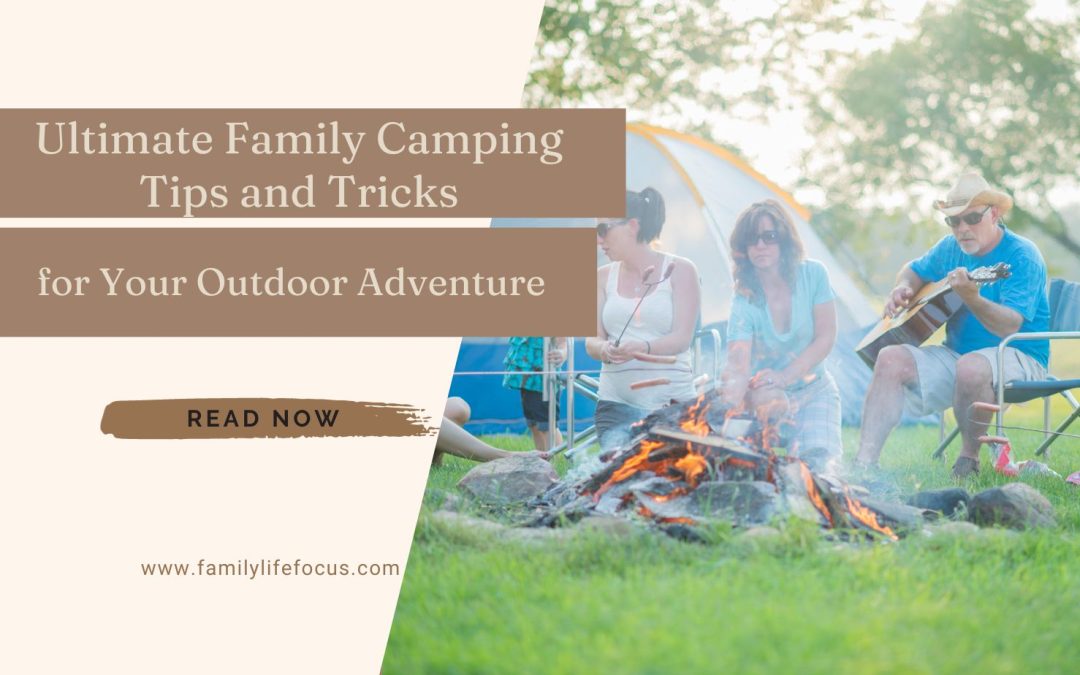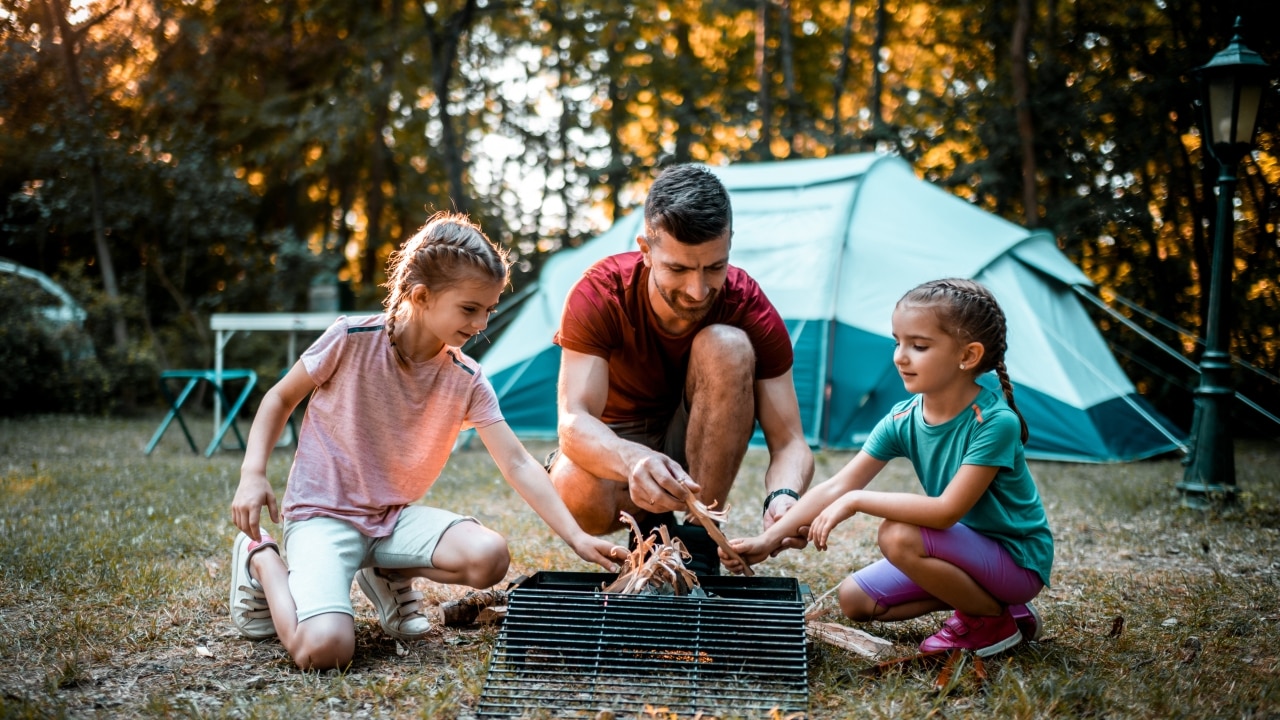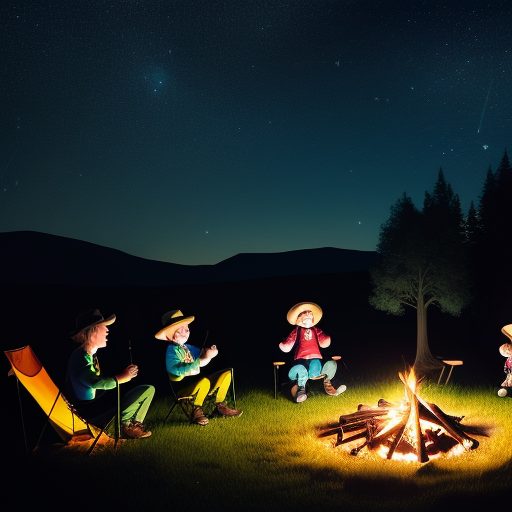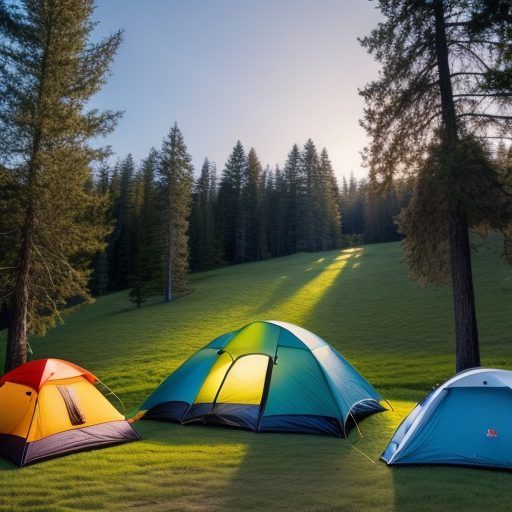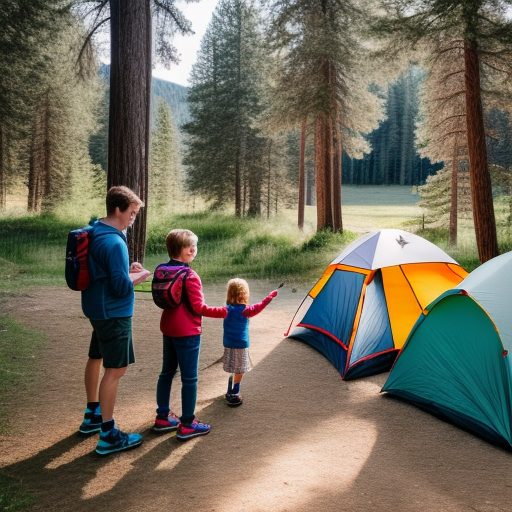==================
Affiliate Statement and a Caveat
First off, a little caveat: within my articles you will find affiliate links, meaning if you buy them, I get a small commission. Your cost is not affected. In addition, I am an Amazon Associate and I earn from qualifying purchases on Amazon.
And yes, if I say that I recommend a product here, it means I truly believe it is a good product. I refuse to recommend any product that I have not researched and believe to be a good value.
Even better, I provide you with a very clear picture of the product, it’s use, and the probable value.
Earning your trust is important to me. I run this website myself and the commissions and donations help support the site.
Sound reasonable and fair enough? Let’s continue to the article.
==================
Are you planning your next family camping trip? Whether you’re a seasoned outdoors enthusiast or embark on your first camping adventure, preparation is critical to ensuring a successful and enjoyable experience for the whole family. This comprehensive guide will explore valuable family camping tips and tricks covering everything from selecting a suitable campsite to staying safe outdoors. So, let’s dive in and make the most of your family camping adventure!
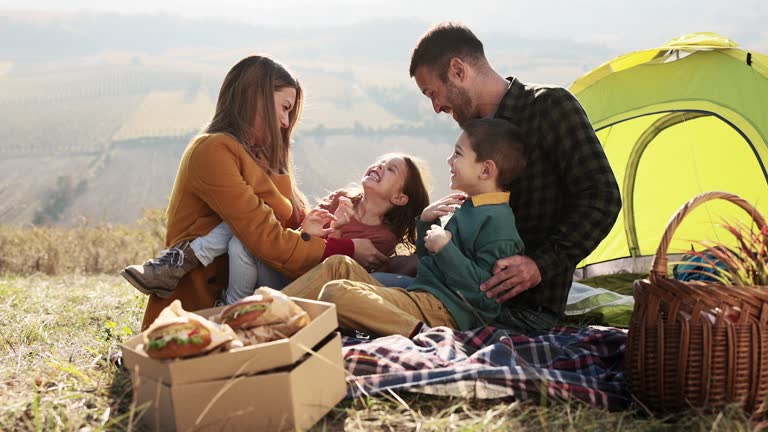
Family camping trips offer an incredible opportunity to create lasting memories, bond with loved ones, and disconnect from the hustle and bustle of daily life. Whether camping with young kids, older kids, or both, the tips and tricks we’ll share are designed to enhance your experience, making it enjoyable and stress-free.
By the end of this blog, you’ll have a wealth of knowledge at your fingertips to ensure your family camping trip is a resounding success. We’ll cover everything from setting up camp and packing smart to engaging in family-friendly activities and staying safe in the wilderness.
So, let’s begin your journey to becoming a family camping pro!
Setting Up Camp
Setting up camp is a crucial part of any family camping trip. Choosing a suitable campsite and having the essential gear can make your outdoor adventure comfortable and enjoyable. Let’s explore tips and tricks to ensure a smooth camping experience.

Choosing the Right Campsite
Selecting the perfect campsite is the first step to a successful family camping trip. Here are some key considerations when choosing your campsite:
- Proximity to Facilities: Look for a campsite close to essential facilities such as clean water sources and restrooms. Access to these amenities can make your camping experience more convenient, especially with kids.
- Safety Considerations: Prioritize safety when selecting a campsite. Ensure the terrain is level and free from hazards like cliffs or unstable rocks. Watch for potential wildlife activity and follow proper food storage guidelines to minimize encounters with animals.
- Scenic Locations: While safety and convenience are essential, don’t forget to appreciate the beauty of nature. Choose a campsite with scenic views, whether by a lake, in the woods, or overlooking a stunning vista. A picturesque setting can enhance your family’s camping adventure.
Essential Gear for Camping
The right gear is essential to make your camping trip comfortable and enjoyable. Here’s a breakdown of the necessary camping gear:
- Tents and Shelter: Invest in a durable, weather-appropriate tent that accommodates your family size. Ensure it’s correctly set up and secured to keep everyone dry in case of rain. A tarp or canopy can provide additional shelter for cooking or relaxing.
- Sleeping Bags and Pads: Choose sleeping bags suitable for the expected weather conditions. Make sure everyone has a sleeping pad or mattress for insulation and cushioning. Kids often sleep better when comfortable, so consider their needs.
- Camp Kitchen Setup: Bring a portable camp stove, cookware, and utensils for meal preparation. Don’t forget essentials like a can opener, knife, and cutting board. A cooler with ice packs is crucial to keep food cold and fresh.
- Lighting and Navigation Tools: Pack reliable flashlights or headlamps with extra batteries. Consider solar-powered string lights for ambient lighting around the campsite. A GPS or map and compass can be handy for navigation during hikes.
Packing Smart
When embarking on a family camping trip, one of the most critical aspects is packing smart. Efficient packing ensures you have all the essentials while keeping your load manageable. In this section, we’ll cover vital aspects of packing for your camping adventure without delving into complexity.
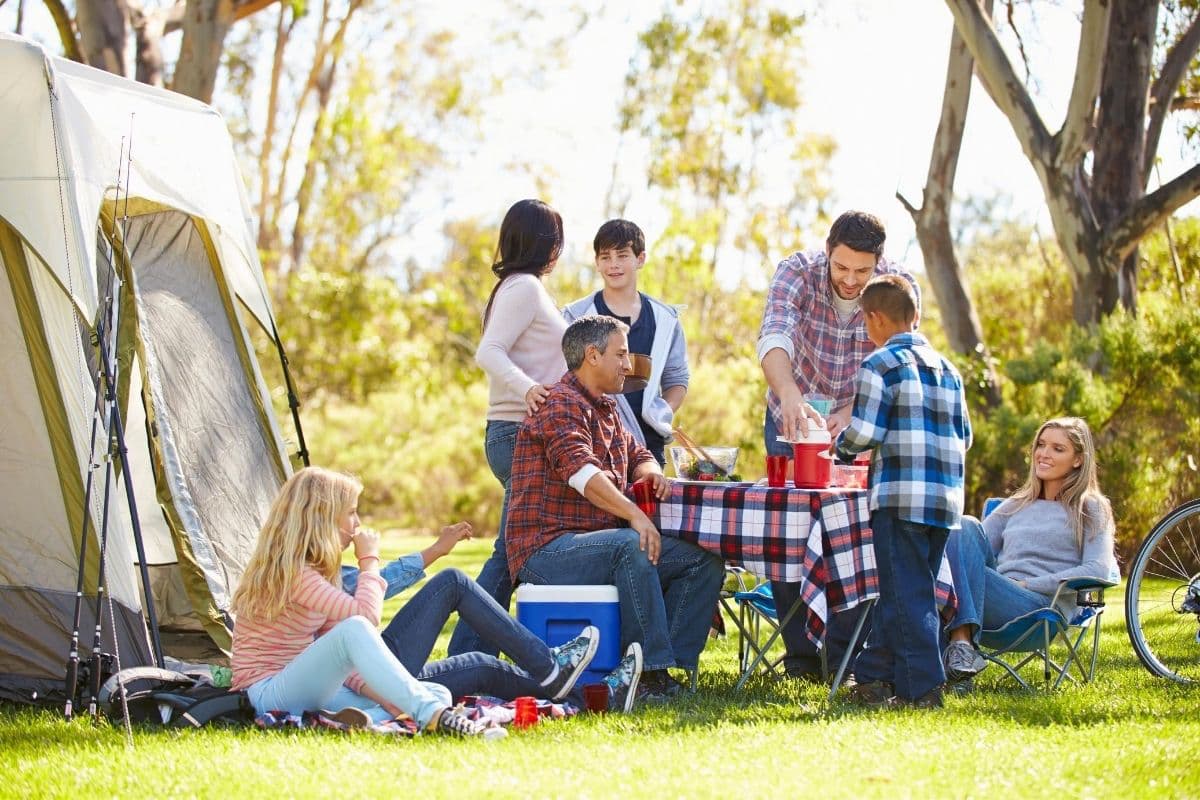
Clothing and Personal Items
Ensuring you and your family have the proper clothing and personal items can make or break your camping experience.
Weather-Appropriate Attire
When it comes to clothing, the key is to pack weather-appropriate attire. Check the weather forecast for your camping destination to determine the expected conditions during your stay. Here’s a simple checklist:
- Layering: Opt for layered clothing to adapt to changing temperatures. Start with a moisture-wicking base layer to keep sweat away from the skin, add insulating layers for warmth, and finish with a waterproof and breathable outer shell to protect against rain and wind.
- Footwear: Bring comfortable, closed-toe shoes for hiking and outdoor activities. Don’t forget extra socks.
- Rain Gear: Pack lightweight and waterproof rain jackets and pants if rain is in the forecast.
- Hats and Gloves: Sun hats and gloves for warm weather and warmer hats and gloves for cold weather.
- Pajamas and Sleepwear: Remember to pack something comfortable to sleep in.
Hygiene Essentials
Maintaining personal hygiene is essential for comfort during your camping trip. Keep it simple with these basics:
- Toothbrush and Toothpaste: Travel-sized versions work well to save space.
- Biodegradable Soap: Use biodegradable soap for washing dishes, hands, and even your body near water sources to minimize environmental impact.
- Hand Sanitizer: It’s a quick and easy way to clean hands when access to water is limited.
- Towels and Washcloths: Microfiber towels are lightweight and quick-drying.
- Toilet Paper: Pack enough toilet paper in a waterproof bag.
First Aid Kit
A well-equipped first aid kit can be a lifesaver in emergencies. You don’t need a complicated medical setup; focus on the basics:
- Band-Aids and Adhesive Tape: For minor cuts and blisters.
- Antiseptic Wipes: To clean wounds and prevent infection.
- Pain Relievers: Over-the-counter pain relievers like ibuprofen or acetaminophen.
- Tweezers: Useful for removing splinters or ticks.
- Scissors: Handy for cutting tape, gauze, or clothing.
- Thermometer: To monitor any feverish symptoms.
- Emergency Contact Information: Write down significant numbers, including emergency services and your campground’s contact information.
- Prescription Medications: If anyone in your family requires prescription medications, ensure you have an adequate supply.
Remember to periodically check your first aid kit and replenish any used or expired items.
Meal Planning and Food Preparation
Proper meal planning and food preparation are vital for a successful camping trip. Here’s how to simplify the process:
Menu Planning
Start by creating a simple menu plan. Consider the following factors:
- Dietary Restrictions: If any family members have dietary restrictions or allergies, plan meals that accommodate their needs.
- Meal Variety: Include a variety of meals to keep everyone interested. Think of easy-to-cook recipes that require minimal equipment.
- Pack Non-Perishables: Select non-perishable foods like canned goods, dried fruits, nuts, and instant meals for convenience.
- Fresh Foods: For the first day or two, bring perishable items like fruits, vegetables, and meats in a well-insulated cooler with ice packs.
- Snacks: Pack plenty of snacks like granola bars, trail mix, and crackers for quick energy boosts.
Food Storage and Coolers
Effective food storage keeps your meals fresh and safe to consume. Here’s how to do it right:
- Coolers: Invest in a high-quality cooler with good insulation. Please keep it in the shade and limit how often you open it to maintain a cold temperature.
- Ice Packs: Use ice packs instead of loose ice to prevent food from getting soggy.
- Food Organization: Organize your cooler by packing raw meats at the bottom, followed by dairy products, and then fruits and vegetables. This prevents cross-contamination.
- Dry Food Storage: Store dry foods in airtight containers or resealable bags to keep them fresh and prevent critters from getting in.
Campfire Cooking Tips
Cooking over a campfire can be a fun and delicious experience. Keep it simple with these tips:
- Campfire Safety: Always follow campground regulations regarding fires. Use designated fire rings or pits when available.
- Cookware: Bring lightweight, portable cookware such as a camping stove, pots, and pans.
- Utensils: For convenience, pack utensils like a spatula, tongs, and a can opener.
- Easy Recipes: Look for easy-to-cook campfire recipes like foil packet meals, one-pot dishes, and skewers.
- Firewood and Extinguishing: Gather firewood and responsibly extinguish the fire before leaving the campsite.
- Campfire Recipes: Get creative with recipes like s’mores, foil-wrapped hot dogs, and roasted marshmallows for a classic camping treat.
Family-Friendly Activities
In the beautiful world of family camping, it’s not just about setting up a campsite; it’s also about making lasting memories and enjoying activities that bring your family closer to nature. Here, we’ll explore some fantastic family-friendly activities that will make your camping trip memorable.
Nature Exploration and Hiking
Nature exploration and hiking are excellent ways to connect with the great outdoors during your family camping adventure. These activities offer a chance to discover the beauty of the natural world while enjoying quality time together.
Trail Maps and Safety
Before embarking on a hiking adventure, preparation is essential. You can obtain trail maps and information about the routes available in your camping area. These maps often provide valuable details about trail length, difficulty levels, and potential hazards. Pay attention to trail markers and follow the designated paths to ensure a safe and enjoyable hike.
Safety Tip: Ensure everyone in your family knows the trail plan, and consider sharing it with a friend or park ranger in case of emergencies.
Nature Identification
Enhance your family’s camping experience by learning about the local flora and fauna. Bring along an essential field guide, or use a nature identification app to help identify plants, trees, birds, and wildlife you encounter on your hikes. This educational aspect can make the outdoor experience more engaging for kids and adults.
Nature Tip: Encourage your children to collect leaves, rocks, or small specimens (where allowed) and create a nature journal to document their discoveries.
Campfire Entertainment
No camping trip is complete without the warmth and camaraderie of a campfire. Campfires provide the perfect backdrop for storytelling, singing songs, and stargazing, creating treasured moments around the flickering flames.
Stories and Songs
Gather around the campfire and share stories or sing campfire songs. Storytelling can spark imagination and entertain everyone as tales of adventure, mystery, and humor are woven into the night. Campfire songs add a musical touch to your evenings, with classic tunes like “Kumbaya” or “This Land Is Your Land.”
Entertainment Tip: Bring a book of campfire stories or songs for inspiration, and encourage each family member to contribute their own.
Stargazing and Nighttime Activities
Camping offers an exceptional opportunity for stargazing due to the lack of city lights. Lay out a blanket, recline, and marvel at the night sky. You can also bring binoculars or a small telescope to look closely at celestial objects like the moon and planets.
Nighttime Tip: Identify constellations or planets in advance using stargazing apps or guides, and challenge your family to find them in the night sky.
Outdoor Games and Recreation
Keeping the whole family entertained during a camping trip is a breeze when you have a repertoire of outdoor games and recreational activities. These activities encourage physical activity, teamwork, and laughter.
Fun Camping Ideas
- Scavenger Hunt: Create a list of items for your kids to find in the campground or surrounding nature. This can include pinecones, specific leaves, or unique rocks.
- Geocaching: Participate in the modern-day treasure hunt by searching for geocaches using a GPS or smartphone.
- Nature Art: Collect natural materials like leaves, sticks, and flowers to create artwork, such as leaf rubbings or nature collages.
Fun Tip: Organize a mini-Olympics with family-friendly competitions like sack races, tug-of-war, or a frisbee toss.
Gear for Active Camping
Make sure to bring along gear that encourages outdoor play. Consider items like frisbees, soccer balls, or badminton sets. These simple yet versatile toys can provide hours of fun for kids and adults. Gear Tip: Pack compact and lightweight sports equipment to save space and make it easier to transport.
Staying Safe During Your Family Camping Trip
Camping with your family is a fantastic way to bond, create lasting memories, and enjoy the outdoors. However, ensuring everyone’s safety while camping is of utmost importance. Explore essential tips and tricks for staying safe during your family camping adventure.

Wildlife and Insect Safety
Camping often takes us into the natural habitats of various wildlife, and we need to be prepared for potential encounters. Here are some critical considerations for wildlife and insect safety:
Bear Safety
Taking precautions to prevent bear encounters is crucial when camping in a bear country. Follow these bear safety guidelines:
- Food Storage: Store all food and scented items in bear-resistant containers or bear bags to keep them away from your campsite.
- Cooking: Cook and eat away from your sleeping area to avoid attracting bears.
- Bear Spray: Carry bear spray and know how to use it in case of a bear encounter.
- Noise: Make noise while hiking to alert bears of your presence and avoid surprising them.
Insect Repellents
Insects like mosquitoes and ticks can be a nuisance and carry diseases. To protect your family from insect bites:
- Use Insect Repellent: Apply insect repellent on exposed skin and clothing. Choose one suitable for children if camping with kids.
- Wear Protective Clothing: Dress long sleeves and pants to minimize exposed skin.
- Tick Checks: Check everyone for ticks after outdoor activities, particularly in hidden areas like armpits and the hairline.
Food Storage Guidelines
Proper food storage not only prevents wildlife encounters but also keeps your family safe from foodborne illnesses:
- Cooler Use: Use coolers with secure latches to store perishable food. Keep them at a safe temperature with ice packs or ice.
- Seal Food Containers: Keep all food items in sealed containers to deter wildlife from attempting to access them.
- Clean-Up: Clean cooking utensils and dishes promptly, disposing of food scraps in designated waste containers.
Emergency Preparedness
No one plans for accidents or emergencies, but being prepared can make all the difference. Here’s how to ensure your family’s safety in unexpected situations:
First Aid Training
Having basic first aid knowledge and supplies is essential. Consider the following:
- First Aid Kit: Pack a well-stocked kit, including bandages, antiseptic wipes, adhesive tape, scissors, and necessary medications.
- CPR Training: If possible, learn CPR and basic life-saving techniques. It’s a valuable skill in emergencies.
- Emergency Contacts: Carry a list of emergency contacts, including local authorities and nearby medical facilities.
Communication Devices
In remote camping areas, you may need cell phone reception. Ensure you can communicate when required:
- Two-Way Radios: Invest in two-way radios to stay in touch with family members within the campsite.
- Satellite Phones: If camping in highly remote areas, a satellite phone can be a lifeline in emergencies.
Evacuation Plans
In case of severe weather or unforeseen emergencies, having an evacuation plan is crucial:
- Weather Alerts: Monitor weather forecasts before and during your camping trip to stay informed about any severe weather warnings.
- Emergency Exits: Know the location of emergency exits or escape routes from your campsite.
- Family Meeting Point: Establish a designated meeting point within the campsite where family members can gather in case of separation.
By prioritizing wildlife and insect safety and emergency preparedness, you can enjoy your family camping adventure with peace of mind, knowing you are well-prepared for whatever nature throws.
Environmental Responsibility
Camping is a beautiful outdoor activity that allows families to connect with nature and create lasting memories. However, with the joy of spending time outdoors comes the responsibility of caring for the environment. Let’s explore essential environmental responsibility practices for family camping, focusing on the Leave No Trace principles.
:max_bytes(150000):strip_icc()/Family-Camping-572133413df78c5640da472b.jpg)
Leave No Trace Principles
Leave No Trace (LNT) is a set of principles designed to promote responsible outdoor ethics and minimize the impact of human activities on the environment. By adhering to these principles, you can ensure that your family camping trip leaves behind no harmful traces and preserves the natural beauty for future generations.
Minimizing Impact
When embarking on a family camping adventure, it’s crucial to minimize your impact on the environment. Here are some simple yet effective ways to do so:
- Stay on Designated Trails: Stick to established trails and campsites to avoid trampling on fragile vegetation. Straying from these paths can harm the ecosystem and erode the soil.
- Campsite Selection: Choose a campsite at least 200 feet from lakes and streams. This helps protect aquatic habitats and maintains water quality.
- Respect Wildlife: Observe wildlife from a distance and never feed them. Feeding wild animals can disrupt their natural behavior and harm their health.
Proper Waste Disposal
Proper waste disposal is a fundamental aspect of responsible camping. By managing your waste thoughtfully, you can help keep the environment clean and prevent pollution. Here’s how to do it:
- Trash and Recycling: Bring trash bags and separate recyclables from non-recyclables. Pack out all trash, including food scraps, and dispose of it properly in designated receptacles.
- Toileting in the Outdoors: If no restroom facilities are available, follow Leave No Trace principles for human waste disposal. Use a portable toilet or dig a small hole at least 200 feet away from water sources to bury waste properly.
- Pack It In, Pack It Out: Whatever you bring into the camping area should leave with you. This includes food packaging, plastic containers, and other waste generated during your trip.
Respect for Nature
Respecting nature goes beyond physical actions; it involves appreciating and preserving the natural world. Show your respect for nature by:
- Observing Quiet Hours: Many campgrounds have designated quiet hours to minimize noise disturbances to wildlife and other campers. Respect these hours and keep noise to a minimum.
- Staying Informed: Educate yourself and your family about the local flora and fauna. Understand which species are endangered or sensitive to human activity, and take extra care around their habitats.
- Leave What You Find: Avoid picking plants, disturbing rocks, or collecting natural artifacts. Leave them as you found them so others can enjoy them, too.
Following these Leave No Trace principles and practicing responsible camping can help protect the environment and ensure your family camping trips positively impact the great outdoors.
Troubleshooting Common Camping Issues
Camping is a delightful adventure, but it can be challenging sailing. Sometimes, you encounter unexpected challenges. Let’s explore common camping issues and provide practical solutions to ensure your family camping trip is enjoyable.
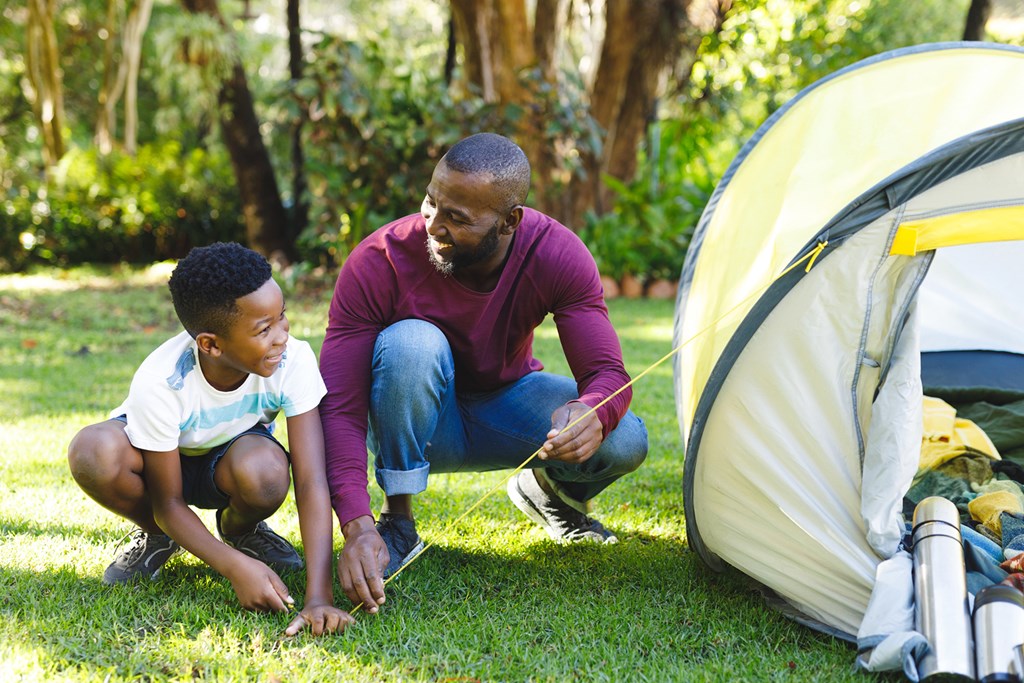
Dealing with Bad Weather
Weather can be unpredictable, and preparing for adverse conditions is essential to keep your family comfortable and safe during a camping trip.
Rainy Day Activities
Rain doesn’t have to dampen your spirits. Here are some fun activities to enjoy when the rainclouds roll in:
- Card Games: Bring cards for games like Go Fish, Crazy Eights, or Uno.
- Storytelling: Share stories around the campfire or inside the tent.
- Craft Time: Pack some art supplies for creative indoor projects.
- Nature Journaling: Encourage kids to observe and sketch plants and wildlife from the shelter.
- Cooking Adventures: Try cooking or baking with a portable camp stove inside your tent.
Staying Dry
Staying dry is crucial for maintaining comfort in wet conditions. Here’s how to keep your family dry when camping:
- Quality Rain Gear: Invest in waterproof jackets, pants, and boots for everyone.
- Tarps and Rainflies: Use tarps to create rain shelters over cooking areas and seating.
- Proper Tent Setup: Ensure your tent is pitched correctly with a rainfly to prevent leaks.
- Ground Tarp: Place a ground tarp under your tent to avoid groundwater seepage.
- Dry Bags: Store essential gear and clothing in dry bags to prevent moisture from seeping in.
- Campsite Selection: Choose elevated ground or a well-draining area to set up your campsite.
Managing Campsite Neighbors
Campsites are often near other campers, which can lead to potential conflicts. Maintaining a friendly and peaceful atmosphere in the great outdoors is essential.
Noise Etiquette
Loud noises can disrupt the serenity of the wilderness and disturb fellow campers. Follow these noise etiquette tips:
- Quiet Hours: Respect campground quiet hours and keep noise to a minimum.
- Use Earplugs: Provide earplugs for family members who might be sensitive to noise.
- Volume Control: Keep music and conversations at a low volume.
- Noisy Activities: Avoid noisy activities like chopping wood early in the morning or late at night.
- Headphones: Encourage the use of headphones for personal entertainment.
Conflict Resolution
Conflicts can arise, but they don’t have to escalate. Here’s how to handle disputes with campsite neighbors:
- Open Communication: If an issue arises, approach your neighbors calmly and politely.
- Mediation: Campground hosts or rangers can help mediate disputes if needed.
- Offer Solutions: Suggest compromises or alternative solutions to resolve conflicts.
- Keep an Open Mind: Be willing to understand your neighbor’s perspective and find common ground.
- Know the Rules: Familiarize yourself with campground rules and regulations to address disputes within the framework of the rules.
Preparing for bad weather and maintaining good relations with campsite neighbors is essential to a successful family camping trip. You can overcome these challenges and maximize your outdoor adventure with the right gear and a considerate attitude.
Your Family Camping Journey Begins!
Family camping is a thrilling journey that bonds us with nature and strengthens family ties. As you plan your next family camping trip, remember these essential tips and tricks to ensure a memorable adventure.
Pack your sleeping bags, gather your camping gear, and head out on your family camping adventure. When camping with kids, consider their needs and interests to keep them entertained. Try camping hacks like using glow sticks for just enough light and making your fire starters from cardboard toilet paper rolls.
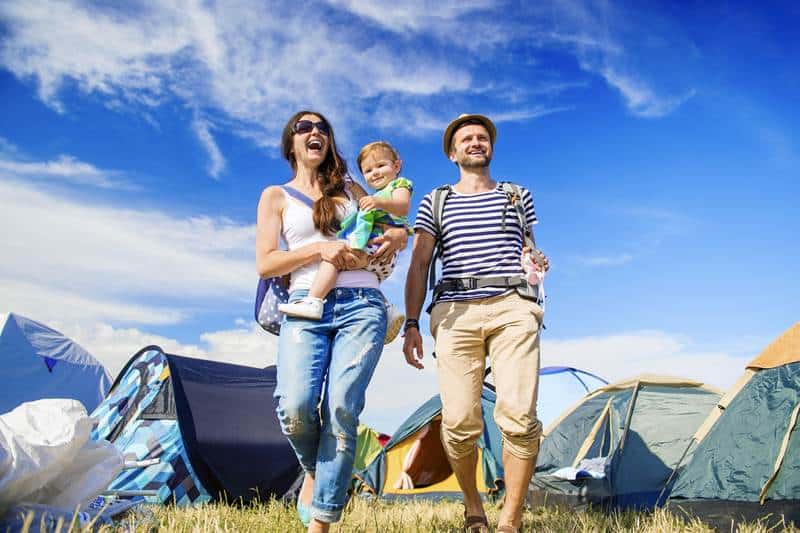
Whether you’re car camping or embarking on a cabin camping adventure, the great outdoors offers countless opportunities for fun camping activities. From hiking in a national park to enjoying board games at the picnic table, you’ll create lasting memories.
Remember to prioritize safety with a well-stocked first aid kit and follow camping tips like bear safety and campfire regulations. Be responsible campers, leaving no trace and respecting nature.
So, gather the entire family, pack food to eat delicious meals, and bask in the beauty of the outdoors. With these family camping hacks, you’ll have a fantastic trip that kids love, inspiring your family to embrace outdoor adventures. Happy camping!
Frequently Asked Questions
What are some essential family camping tips and tricks for our next trip?
Planning your family camping trip is crucial. Choose a safe and scenic campsite with nearby facilities like restrooms and clean water. Make a camping gear checklist, including sleeping bags, tents, and cooking supplies. Pack weather-appropriate clothing, and remember a first aid kit.
How can I keep young kids entertained during our family camping adventure?
Engage younger kids with outdoor games and nature exploration. Bring simple toys like glow sticks and consider a camping high chair for mealtime convenience. Storytelling by the campfire and stargazing are also great options.
What are some cool camping ideas for older kids to enjoy?
Older kids can have fun with camping activities like hiking and birdwatching. Bring board games for entertainment, and let them participate in setting up the campsite. Involving them in food preparation is a great way to bond.
Can you share food camping hacks for delicious meals while camping?
Absolutely! Pack foods easy to cook over the campfire, like hot dogs and marshmallows. Use cardboard toilet paper rolls as fire starters. Consider a portable campfire grill for versatile cooking options.
How can I ensure a good night's sleep during our next family camping trip?
Invest in quality sleeping bags and comfortable sleeping pads. Choose a flat campsite to avoid discomfort. Wearable sleeping bags are ideal for kids. Also, bring solar-powered string lights for a cozy ambiance.
What are some family camping hacks for staying safe in the outdoors?
Practice bear safety by storing food properly. Carry a first aid kit, communicate using reliable devices, and have an evacuation plan. Educate your family about insect repellents to avoid bug bites.
Are there any tips for keeping the food cold on a camping trip?
Use coolers with ice packs or frozen water bottles to keep food cold. Freeze food items before packing. Store the cooler in a shaded spot and avoid opening it frequently.
Can you suggest some fun camping activities for the entire family?
Sure! Try setting up a play tent, picnic on a blanket, or explore a nearby national park. Board games and campfire stories are excellent ways to bond and have a memorable time.
🌟 Unleash the Power of Family Bonds! Join Us at Family Life Focus Today! 🌟
Are you ready to strengthen your family’s foundation and create lasting memories together? You can look no further than Family Life Focus, your one-stop destination for enhancing family connections and nurturing a harmonious home.
At Family Life Focus, we’re dedicated to providing you with valuable resources, expert advice, and a supportive community that understands the importance of family. Whether you’re looking for tips on effective communication, fun family activities, or guidance on navigating challenges, our platform has you covered.
Take advantage of this incredible opportunity to elevate your family life. Visit Family Life Focus now and start your journey toward a happier, healthier, and more connected family! Your family deserves the best; we’re here to help you achieve it.

